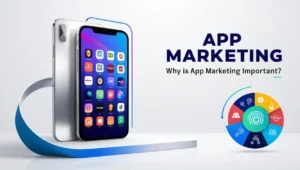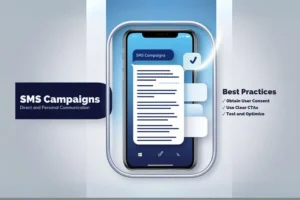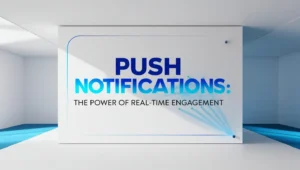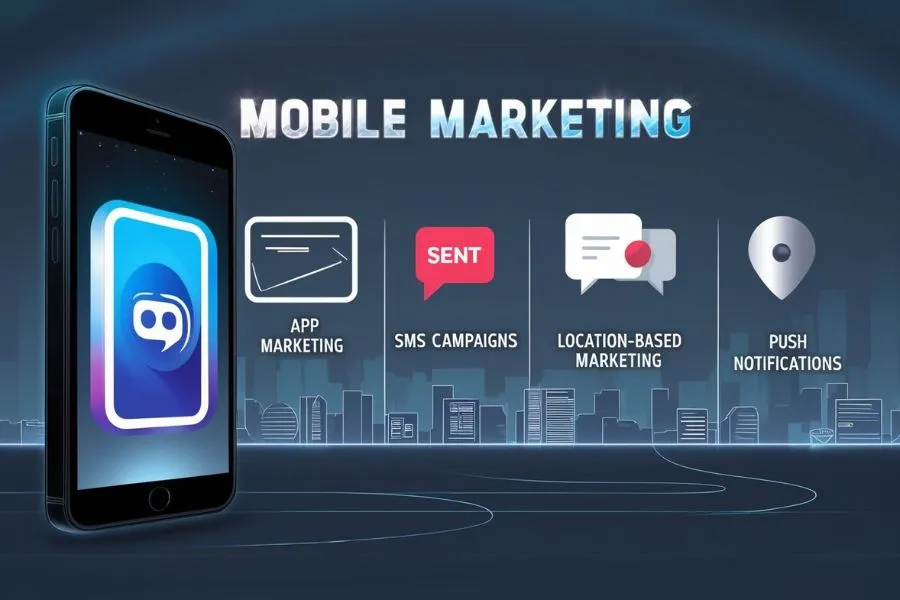Mobile devices have become an important part of human beings. With the average person spending hours on their smartphones every day, mobile marketing has quickly evolved into one of the most powerful tools for businesses to connect with their audience. In this blog, I’ll dive deep into the various aspects of mobile marketing, including app marketing, SMS campaigns, location-based marketing, and push notifications.
What is Mobile Marketing?
Mobile marketing refers to any marketing activity that targets users on their smartphones, tablets, or other mobile devices. It involves various strategies aimed at engaging customers through mobile apps, websites, social media, and text messaging. With over 5.4 billion mobile users worldwide, mobile marketing has emerged as one of the most direct and effective ways to reach consumers.
Why Mobile Marketing Matters
| Statistic | Data |
| Global smartphone users (2023) | 6.92 billion |
| Mobile ad spending (U.S., 2025) | $290 billion (source: Statista) |
| Average smartphone screen time | 4-5 hours/day |
Mobile marketing provides unparalleled reach and engagement, making it essential for businesses aiming to grow in today’s competion.
App Marketing: A Crucial Element for Businesses

App marketing is a specific type of mobile marketing that focuses on driving user acquisition, retention, and engagement for a mobile application. In the app-driven world we live in, having a well-thought-out app marketing strategy is crucial for success.
Why is App Marketing Important?
Millions of apps are available in app stores. Only having a good app is not enough. You need to ensure that your app is visible, compelling, and gets downloaded by your target audience.
Strategies for Effective App Marketing
| Strategy | Description |
| App Store Optimization | Optimize app title, description, and keywords to improve discoverability. |
| Paid Advertising | Use platforms like Google Ads or Meta Ads to run targeted campaigns. |
| Push Notifications | Re-engage users by sending timely reminders or offers. |
| Social Media Integration | Promote app downloads through your social channels with engaging content. |
Example: Nike’s App Marketing Strategy
Nike leverages personalized rewards and exclusive in-app content to engage users. This strategy has helped them maintain a loyal user base.
SMS Campaigns: Direct and Personal Communication

SMS campaigns, also known as text message marketing, are one of the most direct forms of communication with your audience. With open rates of over 98%, SMS messages are highly effective for sending time-sensitive updates, promotional offers, and reminders.
Why SMS Campaigns Matter
While other channels like email or social media may be overlooked by users, text messages have an incredibly high engagement rate. SMS campaigns allow you to send messages directly to your customer’s pocket, which makes it personal and immediate.
Best Practices for SMS Campaigns
| Best Practice | Explanation |
| Obtain User Consent | Always ensure compliance with data protection laws like GDPR or TCPA. |
| Use Clear CTAs | Include links or actions, e.g., “Click here to claim your offer.” |
| Test and Optimize | Experiment with timing, tone, and message length to find what resonates with your audience. |
Example: Starbucks has been very successful with SMS marketing. They send personalized offers and reminders about loyalty rewards directly to customers’ phones, encouraging repeat visits to their stores.
Location-Based Marketing: Engaging Users on the Go
Location-based marketing (LBM) is the practice of targeting users based on their physical location. By leveraging GPS and geofencing technologies, businesses can send hyper-localized messages, special offers, or promotions to users when they’re in proximity to a store or specific location.
Why Location-Based Marketing Works
Location-based marketing is incredibly powerful because it delivers contextually relevant offers in real time. When users are close to your business, sending them an enticing offer or a call to action can drive immediate conversions.
Types of Location-Based Marketing
| Type | Description | Example |
| Geofencing | Virtual perimeter around a location. Messages are sent when users enter this area. | Retail stores offering discounts nearby. |
| Beacons | Bluetooth devices send notifications to nearby users. | Museums providing tour information. |
| Proximity Marketing | Sending updates/offers when users are near a specific product or display. | Grocery stores with aisle-specific offers. |
Push Notifications: The Power of Real-Time Engagement

Push notifications are messages sent to a user’s mobile device, even when the app is not open. These notifications appear as banners or alerts and can prompt users to take immediate action, such as checking out new products, reading a blog post, or completing a purchase.
Why Push Notifications Matter
Push notifications are an incredibly effective way to re-engage users, share important updates, and drive sales. Unlike other forms of mobile marketing, push notifications can be highly personalized, ensuring that users receive messages that are relevant to their interests.
Best Practices for Push Notifications:
- Personalize Your Messages: Use customer data to personalize push notifications based on behavior, preferences, and past interactions.
- Timing: Send notifications at the right time to avoid annoying your users. For example, sending a reminder for a sale during lunch break hours can be more effective than sending one at midnight.
- Clear Call to Action (CTA): Always include a clear CTA that directs the user to take action. Whether it’s visiting your website, redeeming an offer, or opening the app, make sure the next step is clear.
Example: Spotify uses push notifications to inform users of new playlists, music releases, or special offers. By tailoring notifications based on users’ listening history and preferences, Spotify increases engagement with personalized content.
Mobile Marketing Tools to Get Started
Here are some tools to help you implement mobile marketing strategies:
| Tool | Purpose | URL |
| Google Ads | Mobile app campaigns | ads.google.com |
| Twilio | SMS campaign management | twilio.com |
| Branch Metrics | Deep linking for apps | branch.io |
| Localytics | Push notification optimization | localytics.com |
Final Thoughts
Mobile marketing is no longer a luxury, it’s a necessity for any business looking to engage with a modern, tech-savvy audience. From app marketing and SMS campaigns to location-based marketing and push notifications, these strategies can help you build a strong mobile presence and stay connected with your customers at all times.
Frequently Asked Questions (FAQs) on Mobile Marketing
1. What is mobile marketing?
Mobile marketing refers to marketing activities targeting users on smartphones, tablets, or other mobile devices. It includes strategies like app marketing, SMS campaigns, push notifications, and location-based marketing.
2. What is app marketing, and why does it matter?
App marketing focuses on promoting mobile applications to drive user acquisition, engagement, and retention. It’s vital due to the intense competition among millions of apps available in app stores.
3. What are SMS campaigns, and how are they beneficial?
SMS campaigns involve sending text messages to users for promotions, updates, and reminders. With open rates of over 98%, SMS campaigns ensure high engagement and allow direct, personal communication with customers.
4. What are the best practices for SMS campaigns?
- Obtain User Consent: Comply with laws like GDPR or TCPA.
- Use Clear CTAs: Encourage actions like “Click here to claim your offer.”
- Test and Optimize: Experiment with message timing and tone to resonate with users.
5. What is location-based marketing?
Location-based marketing uses GPS, geofencing, or beacon technologies to target users based on their physical location. Businesses can send relevant offers or messages to users when they are near specific locations.

